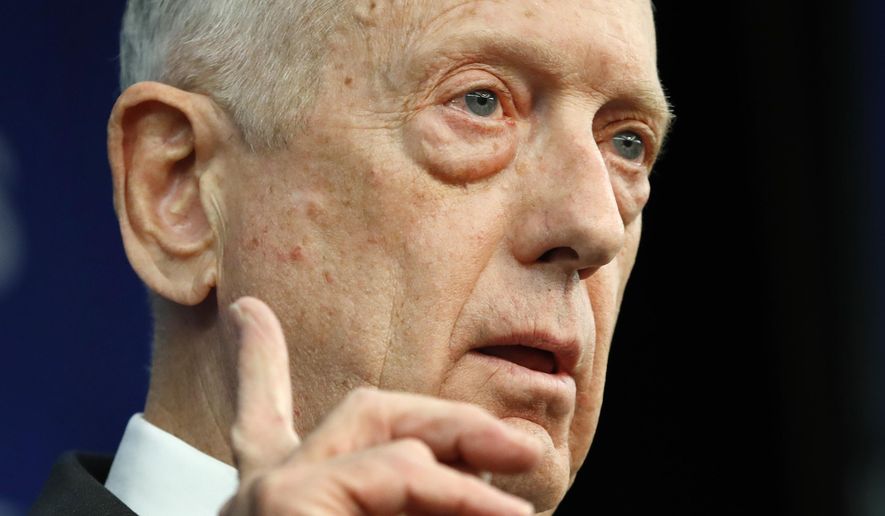Twenty-four hours after his boss took yet another shot at Germany on Twitter, Defense Secretary James N. Mattis on Wednesday praised the European nation and said it’s “on the right trajectory” with respect to its financial contributions to NATO, also telling reporters at the Pentagon that Berlin is an indispensable partner to the U.S. military mission in Afghanistan.
His remarks — offered during a brief question-and-answer session alongside German Defense Minister Ursula von der Leyen — come as the Trump administration continues to heap criticism on Germany for falling short on NATO spending and President Trump slams German Chancellor Angela Merkel’s handling of the immigration problem. Mr. Mattis’ comments also come just weeks before a pivotal NATO summit in Brussels that will serve as a key test of U.S.-European relations.
The Pentagon chief ducked a direct question on whether Germany is now spending enough on defense, but suggested the country is moving in the right direction and making major military contributions in other ways.
“Germany right now maintains leadership of the [international] battle group in Lithuania. Germany right now is contributing to the French operating — they actually lead the NATO campaign in northern Afghanistan, they’re not just contributing, they lead it — and a lot of other nations, allies, and partners are around them,” Mr. Mattis said, adding that the country is a “big contributor” to NATO and regional defense.
“I think they’re on the right track, on the right trajectory,” Mr. Mattis said of Germany’s spending.
The secretary’s strong defense of Germany could help mollify leaders in Berlin, who continue to face stiff attacks from Mr. Trump on NATO spending and a host of other issues. On Tuesday, for example, Mr. Trump seemed to defend his domestic immigration policies by citing statistics arguing that a rise in German crime correlates with a huge uptick in the number of migrants crossing into the country — figures that German officials strongly disputes.
“Crime in Germany is up 10% plus (officials do not want to report these crimes),” the president tweeted. “Other countries are even worse. Be smart America!”
Mr. Trump and Ms. Merkel remain at odds on a host of other issues, ranging from trade, Iran and climate change to the controversial Nord Stream 2 pipeline, a Russian undersea natural gas project that will deepen ties between Moscow and Berlin while bypassing U.S. partners in eastern Europe such as Ukraine.
The two leaders’ personal relationship seems to be frosty at best, and Mr. Trump’s criticism of German immigration policies puts more heat on Ms. Merkel, who faces increasing pressure at home to address migration laws.
On Monday, Mr. Trump took an even more direct shot, tweeting that Germans “are turning against their leadership” in response to the government “allowing millions of people in who have so strongly and violently changed their culture.”
But Mr. Mattis and Ms. von der Leyen avoided even the appearance of tension Wednesday. Mr. Mattis said the Germans’ presence in Afghanistan over the past decade has been crucial.
“They have been there for over a decade since the United States [was] attacked. They have proven their readiness in the field … There’s no doubt that they’ve got ready forces and they are strategically relevant,” Mr. Mattis said.
But within the Trump administration and among its eastern European allies — who are especially hungry for ramped-up NATO investments to ward off potential Russian aggression — there’s an expectation Germany can and should do more.
Last week, for example, Lithuanian Defense Minister Raimundas Karoblis said Mr. Trump is on point in calling for increased NATO spending, and that Germany, Europe’s biggest economy, is the primary offender.
“President Trump is right,” he said in an interview with The Washington Times. “The question is about Germany, first of all.”
The Trump administration has called on all NATO members to dedicate at least 2 percent of their GDP to the alliance, a figure that Mr. Karoblis said his nation is now meeting.
Germany’s contribution over the past 15 years has been far less than 2 percent, NATO figures show, though Berlin has ramped up its spending recently after criticism from Mr. Trump. This week, Ms. Merkel said it will likely take a decade for Berlin to meet the 2 percent target.
• Ben Wolfgang can be reached at bwolfgang@washingtontimes.com.




Please read our comment policy before commenting.